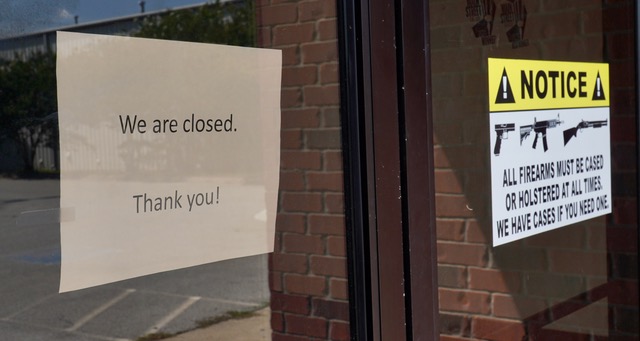
At the halfway point of National Shooting Sports Month, I have cleaned my guns, aligned scopes, replaced batteries, reloaded magazines and fired a total of exactly one live round. I’ve also discovered an ugly truth: there are fewer places available for me to shoot and lots more shooters looking for range time.
My lack of shooting isn’t due to a lack of desire. Repeated heat indices of 102 degrees have something to do with shooting long distances, but it’s not helpful that two of the indoor ranges I’ve used most have closed. The glut of shooters competing for the few remaining range spaces have made range time scarce.
It doesn’t help that I’m not very good or patient enough to wait around, hoping I have the opportunity to squeeze in to a lane between another old guy who can’t figure out why his Gibbs 303 isn’t grouping as well as it did in WWII (maybe it’s his flinch) and the young guy on the other side with a brand-new hand cannon who barely hangs onto it each time he cringes and yanks off another round.
It’s hard to concentrate on your target if you’re busy worrying about someone to either side of you launching a negligent discharge in your general direction. Having become accustomed to shooting ranges where safety isn’t taken lightly, I’m a bit nervous when the range officer’s safety briefing was “keep your head on a swivel in there.” I’m not excited about going in there when the RO won’t.
I have an active membership at the range closest to my house. It abruptly closed, though, with no notice other than a sign on the door reading “We’re closed. Thank You!” Their other range closed, too.

I guess I shouldn’t be all that surprised. It’s the third time it has inexplicably shut down in the six years we’ve lived here. It was a similar story when we lived on the other side of Tennessee. A very nice, locally-owned gun store and a nearby range both opened, and suddenly closed, within months of each other. In an odd plot twist, the retail store failed before the range, but just barely.
With more shooters than any time in recent history and new gun owners looking for places to train and practice, it looks like range failures are almost intentional. Local regulations, environmental rules, and ridiculous insurance rates aside, this seems like a time when ranges should be expanding, not failing.
So why do ranges fail, especially established ones?
Looking for an answer, I called my old friend Miles Hall. Hall opened and grew a terrific shooting facility, H&H Shooting Sports in Oklahoma City. His was the only facility where I’ve ever heard customers referred to as “guests.” The atmosphere there proved that while the customer might not always be right, treating them right was one way to assure success.
Between Miles and my late friend Mark Whitlock of Mark’s Outdoor Sports in Vestavia Hills, Alabama, I learned lots about retailing and customer relationships. They both believed the golden rule of business wasn’t different from the golden rule.
Today, Hall and his family run a consulting business specializing in helping gun shops, ranges and other retail businesses succeed. I hoped he would have some insight into why some ranges and gun shop owners seem insistent on grasping failure from the jaws of almost-certain victory. When I asked why ranges and gun shops fail, he didn’t pause before answering.
“It’s all about their attitude and spirit,” he said. “The reality is that if they really wanted to stay open, most of the places that have closed would still be open.” Instead, Hall says, experience tells him that the “type A” personalities needed to start a business sometimes lack the ability to recognize they can make mistakes.
“Some stores have owners and managers that favor a certain brand of gun,” he explains, “before long, they don’t offer many other brands. Customers looking for other choices go elsewhere. Not a long-term success strategy.”
Others, he says, keep bad employees rather than admit mistakes in hiring. Some, unfortunately, fall victim to bad advice from their business service providers. But, he says, there’s one way to avoid all those mistakes.
“Listen to your guests,” he said. “They will tell you exactly what’s wrong, one hundred percent of the time. Unfortunately, not every business owner listens.”
He had lots of examples, from the store owner whose counter clerks argued with customers who wanted particular brands of guns to range officers who belittled shooters’ abilities rather than trying to encourage them.
As I listened, I realized I’d seen each of those examples play out in real time at the range that suddenly closed near me. I had also listened to a former owner as he bemoaned the fact he’d spent well beyond what he’d budgeted for “improvements.”
If you’re a retailer or range owner who’s seeing dwindling traffic, lagging sales, or empty range positions, you might want to consider looking inside your facility to see what’s holding you back. Worn out lanes, limited inventory, and surly staffers aren’t conducive to success. Nothing guarantees success, but some things, if unaddressed, can guarantee failure.
If you can’t come up with a diagnosis, ask your customers. Listen, follow their advice, and you just might turn critics into cheerleaders. And your business will be headed in the right direction. We’re all pulling for you.
As always, we’ll keep you posted.


Most of what was said applies to any business!
Less so when various levels of government can be outright hostile to their existence and everything can be used against them. But yes business basics are a must.
It simply comes down to the economy. When people are struggling to put food on the table, pay the rent, home mortgage, put gas in the car and pay utilities. Any extra spending goes out the window. Which results in businesses that provide those extras to suffer and fail. When you consider government policies and regulations directly effect the economy. The largest contributing factor for many businesses success or failure is how government effects their ability to be successful. With many of those business owners voting for their own demise.